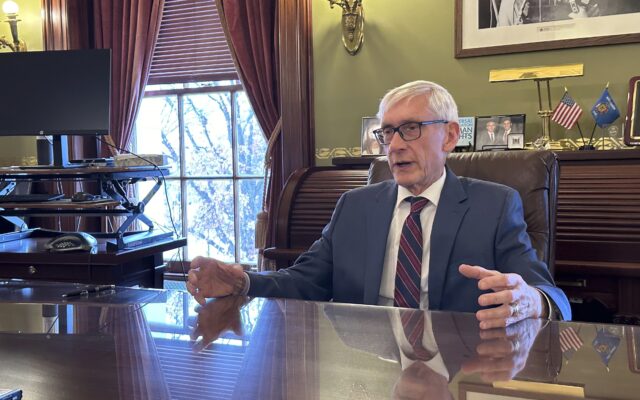Evers again asks Wisconsin Republicans to release $125M to combat forever chemicals pollution

By TODD RICHMOND Associated Press
MADISON, Wis. (AP) — Wisconsin Gov. Tony Evers reiterated Tuesday that he will veto a Republican bill that would create grants to fight pollution from so-called forever chemicals and again asked GOP lawmakers to release to environmental regulators $125 million set aside to deal with contamination.
Republicans who control the Legislature’s powerful finance committee refused to budge, raising the possibility that the money will go unspent indefinitely as municipalities across the state struggle with PFAS contamination in their groundwater.
“Wisconsinites should not have to wait any longer than they already have,” Evers wrote in a letter Tuesday to the finance committee’s co-chairs, state Sen. Howard Marklein and state Rep. Mark Born. “Partisan politics should not stand in the way of addressing PFAS contamination in communities across our state.”
PFAS, short for per- and polyfluoroalkyl substances, are man-made chemicals that don’t easily break down in nature. They are found in a wide range of products, including cookware and stain-resistant clothing, and previously were often used in aviation fire-suppression foam. The chemicals have been linked to health problems including low birth weight, cancer and liver disease, and have been shown to make vaccines less effective.
Municipalities across Wisconsin are struggling with PFAS contamination in groundwater, including Marinette, Madison, Wausau and the town of Campbell on French Island. The waters of Green Bay also are contaminated.
Republicans created a $125 million trust fund in the state budget last summer to address PFAS pollution. Evers has been trying to wrestle the money from them for months but the committee has yet to release a dollar.
Republican state Sens. Eric Wimberger and Rob Cowles authored a sweeping bill that calls for spending the money on grants for municipalities, private landowners and waste disposal facilities to test for PFAS in water treatment plants and wells. Landowners with property that became contaminated through no fault of their own also would be eligible for grants.
The state Senate passed the bill in November and the Assembly followed suit earlier this month. But Evers has said he won’t sign the legislation into law because the bill doesn’t actually release any money and he’s concerned about language that would limit the Department of Natural Resources’ authority to hold polluters liable.
Multiple environmental groups have urged Evers to veto the legislation, saying the limits on DNR enforcement are a deal-breaker. Wimberger and Cowles have argued that the limits are necessary to protect landowners who aren’t responsible for PFAS pollution on their property from fines.
Evers directed the DNR in December to ask the Legislature’s Republican-controlled Joint Finance Committee to simply release the $125 million to the agency, but the committee has taken no action.
The governor promised in his letter Tuesday that he will veto the bill. He wrote that even if he signed it, there was no guarantee the committee would release the money.
Evers said in the letter that he has ordered DNR officials to again ask the committee to release the $125 million to the agency, this time promising it would be spent according to the parameters laid out in the Wimberger-Cowles bill. The governor called the request a compromise.
In a joint statement, Marklein and Born said Republicans made setting aside money for PFAS contamination a priority.
“Governor Evers should sign it instead of holding up these funds to give the DNR authority to penalize innocent landowners,” they said.
Wimberger, who sits on the finance committee, said in a statement that the bill would protect landowners and that Evers is deliberately mischaracterizing them as polluters, which amounts to “oppressive bureaucratic domination.” The statement didn’t address the governor’s latest request to release the money to the DNR.
Wimberger issued another statement later Tuesday saying the bill makes changes in state law to enable the grant programs. Releasing the money to the DNR, even with promises that it will be spent as the bill outlines, will turn it into “a slush fund,” he said.





